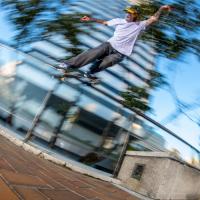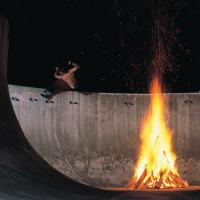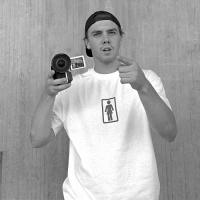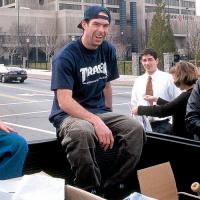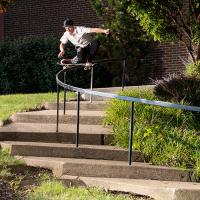The Ray Barbee Interview
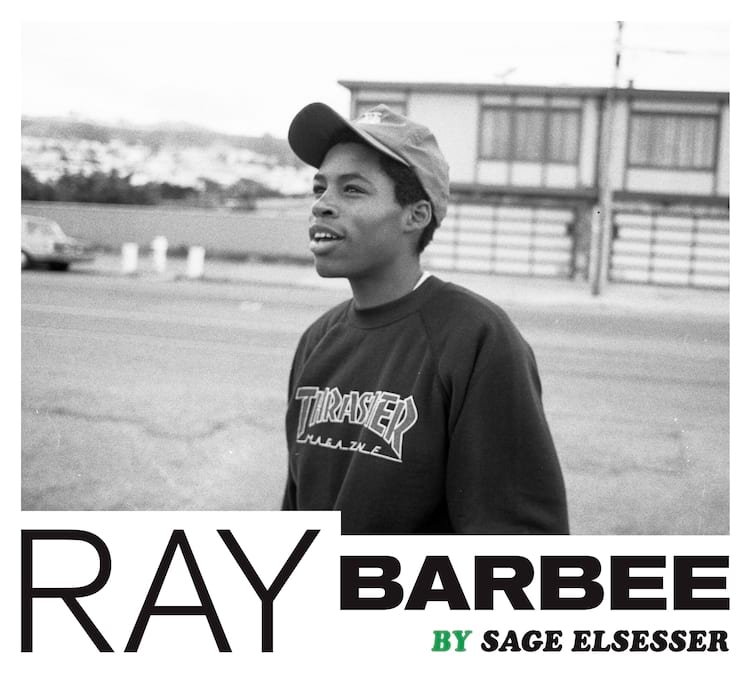 Photo: Ogden
Photo: Ogden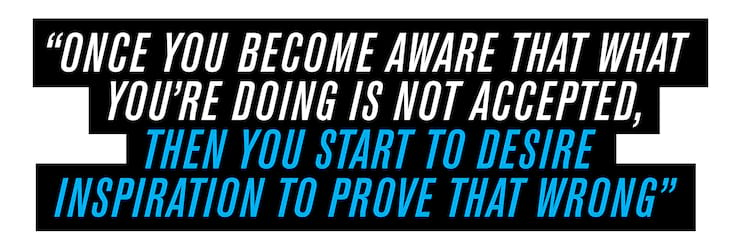 When did you fall in love with skateboarding?
When did you fall in love with skateboarding? I had a neighborhood buddy who I hung out with and we always rode bikes. Over the summer between sixth and seventh grade, his dad gave him a skateboard. I had seen a skateboard before, but it was useless. It was what we called a banana board back then and they were just these plastic boards with soft wheels. There was just no way to be excited about that. But the skateboard that my buddy got, it was a Variflex Spectrum and it had a very dynamic graphic on the bottom. It was 30 inches long and ten inches wide and I was like, Wow, what is that? All of a sudden he’s riding that and I’m on my bike like, Dude, he’s having way more fun than I am. I want to get a skateboard. I could just see that there was something tied to it. It wasn’t a toy, you know what I mean? So I was like, Man, I want to get a skateboard. So this kid’s dad used to skate parks in the ’70s era and he was like, “I think my dad still has his old board in the garage.” We go in the garage and do some digging and, sure enough, we find it. It was a Sims Wood Kick and it had a piece of wood on the back to emulate a tail because it was before they had molds for boards. It kind of split the difference between a banana board and my friend’s Variflex. It wasn’t like the boards that were happening at the time, but that’s where I got in. So we go back to school after the summer. We’re starting seventh grade and now we’re like, We’re skateboarders. We knew there was a surfer/skater wall where the cool dudes hung out, but we didn’t know those dudes. So we’re on the far end of the wall and they’re on the other end. We’re trying to be a part of it but without getting found out that we’re not really a part of it. Eventually one of the guys came over to us and was just like, “What do you guys do?” We were like, “We’re skaters.” And they were like, “You skate? We skate, too. Come hang out with us.” And the brotherhood of skateboarders at my school embraced us. Those guys introduced me to the world and culture of skateboarding. All of a sudden they’re in a punk band, they’ve got a ramp, they’ve got skate magazines and videos, they knew where the skateshop was and they helped me get a better board. And through that I got the desire to want to play music. I had the opportunity to do it because of the accessibility of the community. And so the opposition or the hurdles or what I dealt with was more of the cultural dynamics, the social/economic aspects of the activity. Skateboarding was not an accepted cultural activity for Blacks. And so the grief and the opposition came from other brothers and sisters being like, “Why are you trying to be white?” That was the hurdle. It wasn’t the thing I was doing or the community that embraced me, the hurdle was this thing of defending why you were doing what you’re doing and having fun. My friend was the one Black skater at the school and he was the best skater. He was better than everybody. And he was huge in me seeing that I was on the right track. Because once you become aware that what you’re doing is not accepted, then you start to desire inspiration to prove that wrong. My buddy was that for me. He inspired me to press on towards this thing that people were saying I shouldn’t be doing based on cultural acceptance or the lack thereof. I don’t know if that answered your question…
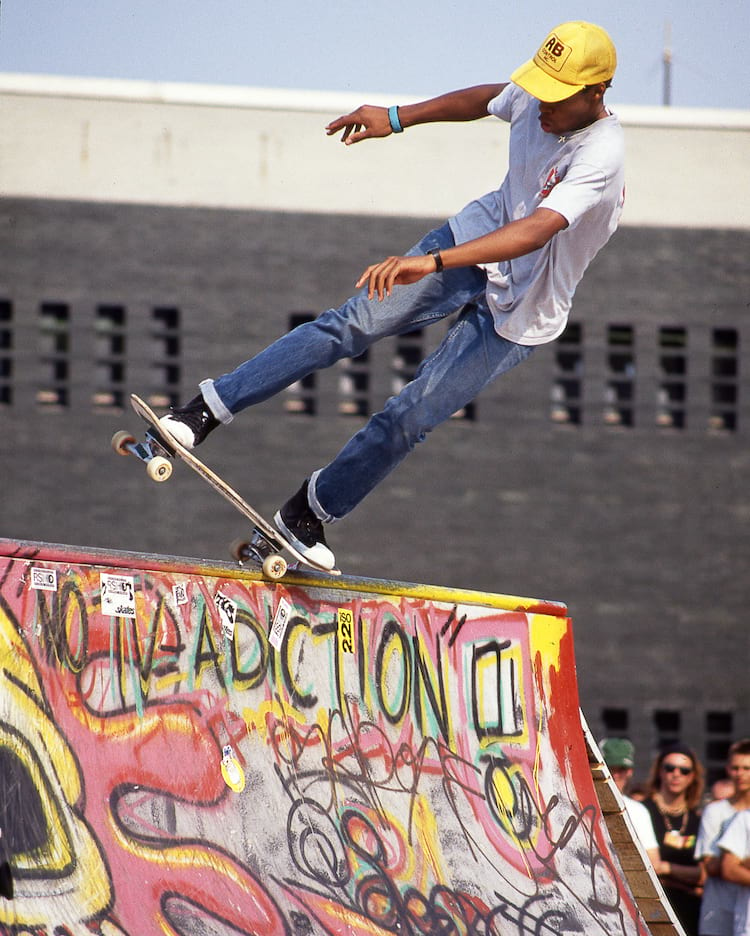 Before Ray everyone skated in shorts. Cuffed and stalled, Munster ’89 Photo: KT
Before Ray everyone skated in shorts. Cuffed and stalled, Munster ’89 Photo: KTWhat influences outside of skateboarding informed you? For me it was Bruce Lee and Michael Jordan.
Before I got into skateboarding, MTV had just come out. So there’s this channel where it’s 24/7 music and what they’re showing is a lot of concert footage because there weren’t too many music videos at the time. And so I’m seeing AC/DC concerts, Led Zeppelin—it was all rock. There was very little Michael Jackson. And so the exposure to MTV, that coupled with two siblings and my dad who was a sax player—he played in a jazz band. He would take me and my siblings to a local music store called Rainbow Records every other Friday and he would let us buy one cassette tape. And so because of MTV, we had bands that we liked. I liked AC/DC, my brother liked Huey Lewis and the News and my sister like Joan Jett, which was reflective of the videos that we were seeing at that time. And so it was through that experience in that time before I got into skateboarding that I had a desire to want to play music. Because as I was watching those videos and those concerts, I could start to see the hierarchy in the sense of like, Okay, you got the singer. He’s the lead man. So you’re like, Okay, this revolves around this dude. But then there was a point in the song, typically in the middle, where another dude comes up with a guitar and does his thing, does his solo. And I was like, That dude is cool. Man, I want to do that. Not just to be cool, but there was an emotional connection to the energy of it all. It was all so new. Because with radio, there’s no visual. We were listening to the radio with my parents. I grew up on a steady diet of soul and jazz, because that was my parents’ deal. So this MTV was like, What is that? Wow. And so I wanted to play guitar before I even got into skateboarding. So my influences, a lot of them come from aspects of the culture of the community, all the various kinds of patches of this quilt—musicians, photographers, artists and things like that. A lot of that influenced me. Steve Caballero and Neil Blender, seeing them in the magazines holding an instrument, knowing that they played in a band inspired me to wrap my head around the idea of skateboarding being first and foremost, but playing guitar did not take away from that. They can exist together. So my influences have come from the culture. They came from within.
 You said that you realized your friend’s skateboard was more than a toy. I felt that same joy in kindergarten during show and tell. A kid brought in a collage of photographs and the one photo that resonated—it was almost like it was skateboard-centric because in the middle there was a photo of him and it said, “My name is… ” It was him sitting on a skateboard. And I was like, I’m not even interested in whatever he’s got to say. I just want to know what that thing is that he’s sitting on. I think that goes hand in hand with music. My father is a musician and he was just always so open-minded. I came home and said, “I want that thing I saw with the wheels.” He was just like, “That’s a skateboard. Do you want one? I have friends who do that.” And he got me a board that day. So the next question that I have for you is, what does music mean to you and why do you feel this relationship is so profoundly special for Black people in particular?
You said that you realized your friend’s skateboard was more than a toy. I felt that same joy in kindergarten during show and tell. A kid brought in a collage of photographs and the one photo that resonated—it was almost like it was skateboard-centric because in the middle there was a photo of him and it said, “My name is… ” It was him sitting on a skateboard. And I was like, I’m not even interested in whatever he’s got to say. I just want to know what that thing is that he’s sitting on. I think that goes hand in hand with music. My father is a musician and he was just always so open-minded. I came home and said, “I want that thing I saw with the wheels.” He was just like, “That’s a skateboard. Do you want one? I have friends who do that.” And he got me a board that day. So the next question that I have for you is, what does music mean to you and why do you feel this relationship is so profoundly special for Black people in particular?Again, MTV spurred on this desire to want to experience it. When I say experience it, I mean perform, play, learn an instrument. I just always saw so many parallels. It’s not surprising that the various patches of the quilt make sense and function so well because there are so many parallels to music and skateboarding. Music has kind of an adhered type of rules thing, but we know that it’s not limited to that. The freedom aspect is the link to all of it—freedom is the center of the spokes. And so if the spokes are all these interests in all these things and they all end back up at the hub of the wheel, to me, that’s where the excitement is and that’s what drew me to these things. And there’s beauty that comes from that freedom. If you function in freedom then you’re able to get really close to your fingerprint—that fingerprint being what I truly believe God created each individual with their unique everything—the way they think, their abilities, all of it. And that is expressed the clearest when it’s functioning in freedom. And that is what I appreciated. That was the parallel. That was the common denominator with these interests in these things. And so when I think about music, it’s that when playing it, it’s like, I can do whatever. I was never one who learned other people’s songs. What excited me was making it up on my own. That excited me so much. And that was the same thing with street skating when I got into it. Because I grew up skating at the tail end of the backyard-ramp era. Because of the history of it coming from the parks and those tricks translating and developing from there, there’s already so much development. There’s a long list of tricks and you’re sitting there checking them off. Okay, I learned backside airs. Check. What should we work on today? Oh, let’s learn frontside airs. Check. Oh, let’s learn inverts. Okay, let’s learn a fakie ollie. Check. And the list went on and on and on. And when we got into skating street, it was like, Okay, learn to ollie. Alright, check. Learn to kickflip. Check. And then it was like, Oh, you mean we can just try to make something up or we can try to whatever? And it’s the same for playing music and I love that to this day. But obviously the more you learn, you draw from that. And when I say learn, I mean the more you listen to music. But it’s that appreciation of other people’s abilities and talents, too, and what they heard in the melodies they listened to and what they do. And so what does music mean to me? It’s just freedom, man. It’s such a cliché term right now, but express yourself. And then my heroes—we’re standing on the shoulders of giants, right? People before us, their talents and their abilities and their craft, they show us what can be done. In a lot of ways, they create the road maps, the direction and things like that. Because learning to play an instrument from that point—I always say you cannot be unaware. If you’re made aware of something, you can’t become unaware. And playing an instrument made me aware of music in a way that I can no longer listen to music the way someone who doesn’t play an instrument can. So my experience with music is so dissecting. I’m aware of rhythms; I’m aware of melodies; I’m aware of time signatures; I’m aware of like, Wow, what a cool bassline against that rhythm. You know what I’m saying? I can’t get rid of that. And so that can lead you towards the appreciation of people’s crafts and it’s what we do in skateboarding. It’s what we do with anything that we’re into. You can appreciate it in a different way because you’re aware of the ability and how special that is. And so when I think about musicians, man, the list goes on and on and on. But right there at the top, because I play guitar, my all-time hero and biggest influence is probably Wes Montgomery. But right there, too, is D. Boon from The Minutemen. And so there’s just so many people. Like my buddy John Herndon, I love his ability, the way he approaches playing his drums, the emotions—it’s inspiring, man. But yeah, on a short list, Wes Montgomery is right at the top, man. Just right there.
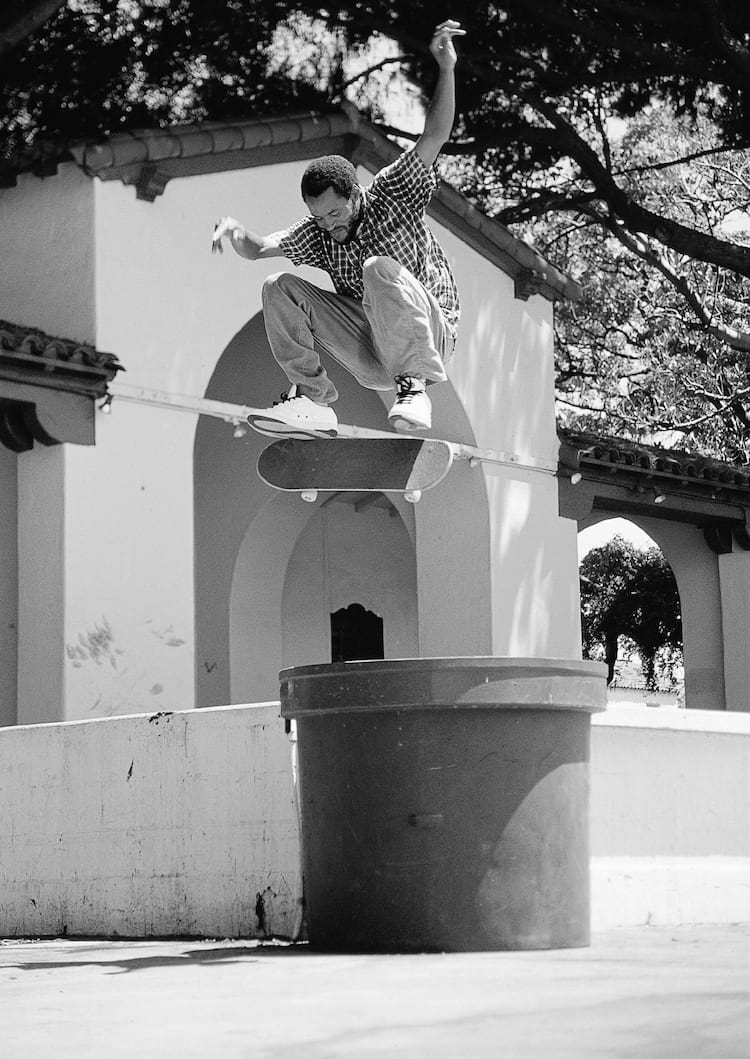 Anybody remember the old Cherry Park? Frontside flip at the turn of the century Photo: Martin
Anybody remember the old Cherry Park? Frontside flip at the turn of the century Photo: MartinI’ve always felt such a profound connection to music. I fell in love with music before skating or any of that. And the way that you say “the freedom,” I think that’s such a precise way to put it. I’ve been getting back into playing guitar, just learning. I’m making these little songs. They’re simple chords, but I’m like, Man, this is just beautiful when you can play something and it resembles how you’re feeling in that moment. There’s nothing greater than that.
Yeah, man, and that is what I was trying to get at. When I was saying freedom, it’s anything that allows you to be so transparent in your expression and for that to come out in this way. To me, that’s what is so beautiful about music. It’s that connection, especially with the human voice, because it can get to places that we can’t—places we struggle to get to with an instrument because it’s that much closer to the heart. And so that’s why it’s the way that people can access that and express their feelings with their voice and you can hear it. You can hear the earnestness and the joy. That’s what I love about music and that’s why I was trying to tie it to the freedom. These are things that allow that to be read, seen or felt. And that’s ultimately why it’s so universal because it’s such a close connection to, I don’t know, dare I say reality of the human condition? Which is humanity, right? There’s an emotional connection to it. So it always speaks, especially when it’s sincere, because not everything allows you to get to that place. Because it’s not set up to do that, but these things are set up to do that. Music’s set up to do that; it’s set up to go there. You can go there; it affords it.

Well, if we think about the shift from the backyard-ramp era to street skating, there was previously a gatekeeper—literally. When you take the gatekeeper out of the equation via street skating, now it’s accessible to anybody who lives where there is cement. That changes the landscape and it changes who gets involved. And when that opens up, diversity comes with it—not only racially, but culturally. So it’s kind of like you’re used to predominantly one ingredient and now you’ve just unleashed all these other ingredients to the flavor of what you’re cooking. If the meal is skateboarding, then we’ve just added so many more interesting seasonings and flavors. And what comes with that is all the different cultures that are able to be in it now because of the accessibility, because now you don’t have to know the dude who knows the dude who has the ramp. Your parent doesn’t have to own their house or have the financial means to build a ramp. You can just get a skateboard and now you can be a part of this thing. And when you’re a part of this thing, you’re bringing your community, your culture, you’re bringing everything to it. And when you get everybody coming to it with that, man, it gets exciting. And so when you break that down to Black culture and what it brings to it, then that’s a flavor and an ingredient. And what’s great about all of it is if there’s an openness, an appreciation for it, then it makes it that much richer of an experience and a culture as a whole because we’re all coming together because of this interest in riding a skateboard. And I’m very grateful for our seasoning that we bring to the meal.
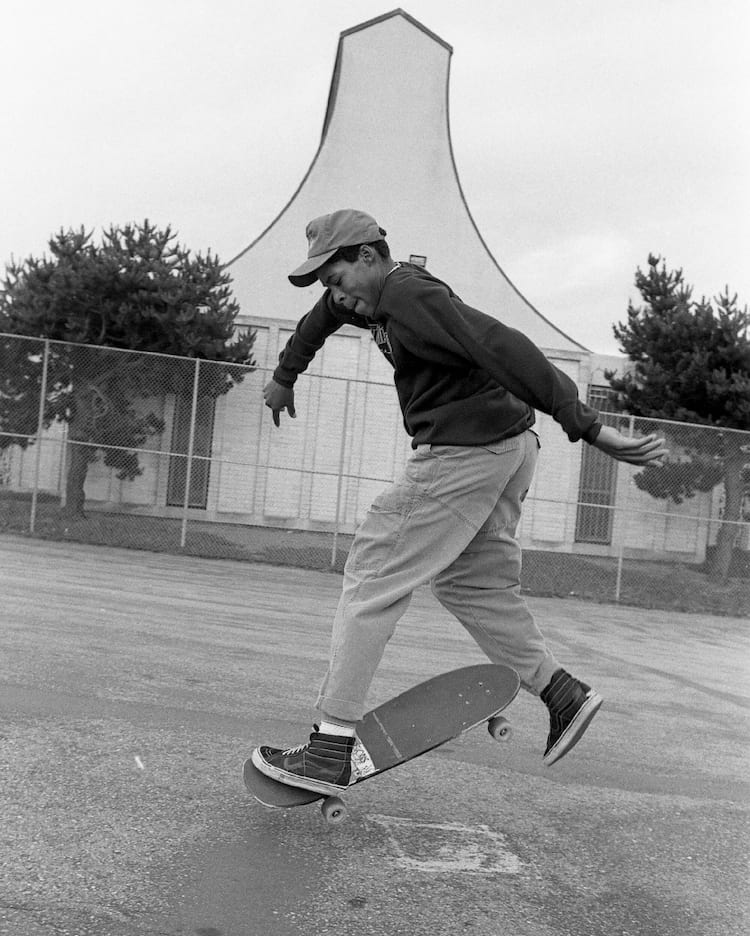 Barbee’s no-complys redefined street skating as something you did WITHOUT grabbing your board. SF, 1988 Photo: Ogden
Barbee’s no-complys redefined street skating as something you did WITHOUT grabbing your board. SF, 1988 Photo: OgdenI often explain to my friends how much skateboarding means to Black people. For me, man, I’m from Mid-City Los Angeles. They say, “You’re going to sell crack, play basketball or rap.” I remember just the hood dudes, they loved seeing that me and my friends were skating and doing something different. And I always express that to people. And I remember recently I was just kind of falling out of love with skateboarding and I spoke to Na-Kel about it and he said, “Man, don’t ever forget how much you love skating and what it did for you.” And as Black people we’re exposed to depression and emotions much earlier. We aren’t given the tools and resources to have a therapist or understand what we’re feeling. We’re more susceptible and if left to our own devices and communities, Black people are more likely to be caught in the web that is systemic racism and lack of resources, but skateboarding kept us out of so much trouble. I’d just like you to speak on what it meant to you to see guys like Kareem, Keenan and Stevie rise to stardom and inspire so many Black youths who wanted to skate.
It all ties back to accessibility, because with accessibility comes involvement. And so with the involvement, abilities and talents are seen and developed. And so when I think about Steve Rocco starting World Industries and the skateboarders that he was sponsoring, the guys that he was turning pro—now it’s giving opportunities to everybody and it brings it down to what it is and not to label it—for me, labels are such a bummer. I’ve always appreciated how I feel that skateboarding doesn’t fit into a label. But what we do is we want to categorize it and we want to label things. And so, I guess what I’m trying to say is the unfortunate thing of saying, “He’s a Black skateboarder,” is that it’s a label. With skateboarding, I didn’t want it to be, “He’s a good skater for being Black.” I always wanted it to be, “Dude, he’s a good skater.”
Dude, Ray Barbee is a very good skater. Get a refresher from his 1989 part in Ban This
And so what was so exciting about what street skating ushered in is it peeled away the label and it was just, “Dude, he’s a ripper. He’s a good skater.” We don’t say, “Paulo Diaz, he’s a good Latino skateboarder.” You know what I mean? We don’t do that. You have an emotional connection to him because you appreciate the dude’s ability and the way it inspires you. I feel street skating afforded opportunity for races that weren’t able to be a part of it previously and to develop and have opportunities. The reality is that people are gifted and have abilities that are amazing and that’s not specific to any race. But I’m very grateful for my race and I’m very grateful for our contributions within this landscape. And I’m so encouraged that from the time that I got in, it’s been opened up to where we can have more and be seen more than by race. It’s opened up for everybody to express themselves and show their freedom. It’s not just limited to a certain demographic of people anymore. Dude, it’s open. And now it’s all over the world and because of technology people are on it in real time. So the progression of it and the ability is developing at such a rate where everybody everywhere who wants to ride a skateboard can and we get to see. Again, it goes back to the seasoning. What spices? Here’s another one. Add it into the deal. I don’t know, maybe we could call it just a gumbo.
It’s so cool that you used that analogy of a gumbo because that comes from a time where there was a lack of resources and ingredients, so it was a community that made a gumbo. What was your biggest misconception about the skateboarding industry and how did you come to terms with that and coexist with it?
That it was one big happy family. I mean, it’s tongue in cheek, but with Lance starting The Firm and me being a part of it and through that process, just the reality of the weird politics in skateboarding. And just becoming aware of those things, because once you’re aware of something, now you see it. And so it kind of made it to where skateboarding was not this big happy family. It’s a business. Learning the business aspect, that right there was a bummer.
 What Black skaters did you look up to, if any, and what Black skaters do you feel continue that legacy?
What Black skaters did you look up to, if any, and what Black skaters do you feel continue that legacy? It goes back to what you were saying about gumbo and about communities coming together. If you are able to appreciate the contributions, irrelevant from what race is bringing the contributions, if we’re just focusing on the contributions themselves, not the labels, then your resource for inspiration is greatly widened, right? To me, so many of my jazz heroes, a lot of these dudes were inspired by—let’s say Wes Montgomery. He was inspired and learned a lot of his stuff from piano players, right? And a lot of these piano players were white dudes. You know what I’m saying? It informed him and allowed him to create a vocabulary and informed his contribution. Man, I guess what I’m trying to say is inspiration is inspiration, dude, and it turns into what you are doing. And so, for me, there’s a beauty in that. Because at the end of the day, you’re an accumulation of all these things, but you don’t want to limit those things. My inspirations and the direction that I was excited about and was driven towards with my skateboarding—there weren’t that many other Blacks for me to draw inspiration from. The mags were 90-percent vert and like 10-percent street. And it was like a photo of Tommy Guerrero, Natas Kaupas or Gonz, that’s all we had. So when we started looking to street and drawing inspiration, there wasn’t anybody to really draw from that I knew of. But what I’m so thankful for is through them and that process, skating becoming its thing. Then seeing like—I keep going back to Rocco because that’s when it was just like, Yeah. You have Ron Chatman and then comes Kareem Campbell and then it starts building—Jovontae, Lavar and Drake Jones,and then it’s just like, Oh cool, man. For me, it was more of a sense of just seeing it grow and grow and feeling like, Oh, this is so cool. From the beginning to where it is now, where it’s just a part of a tapestry; it’s in there. You come in now and you can’t even imagine when I’m even talking about, which is amazing.
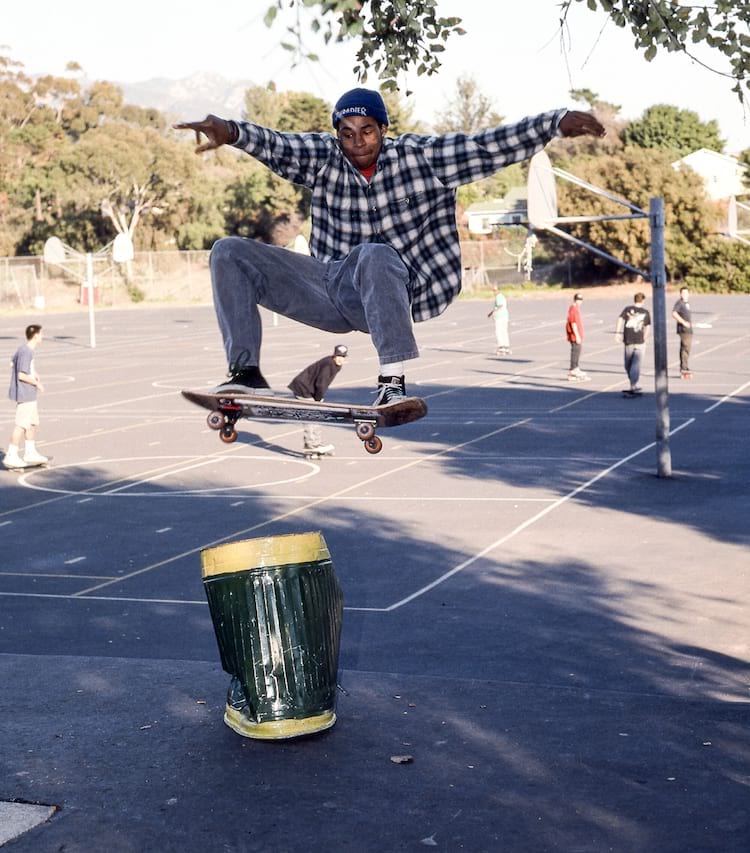 Flying the flannel at a 1990 Pioneer sesh Photo: Mofo
Flying the flannel at a 1990 Pioneer sesh Photo: MofoAbsolutely.
So my deal is a little different because for me there was a sense of seeing it accumulate and just being like, Dope, dope, dope, dope, you know what I mean? Because I came from a time where there was a sense of things having to be proven. That’s the thing with anything—the process is so much slower when you don’t have the example of it functioning or working. Even making up a trick or something, if you haven’t seen someone do it, the battle is different because of the doubt level. You have to fight it and battle it because you’re like, Am I struggling because maybe it just can’t be done? That plays a part of it. Not that I’ve been there all that much, but I have been there at times. And for a Black skater to be just as good as everybody else or even better, or to beat them in a contest or something, I didn’t really have that. Does that make sense? So for me it was so encouraging to see that function and grow. And I can’t leave out Ron Allen. It was just a process, but there weren’t many of us. But to see that grow and grow, and the more it grew, the more it dispelled a doubt because we’re seeing it function. We’re seeing that, This dude is legit and just as good, so there’s no more of like, He’s good for being a Black skater. It’s just, This dude is good. He’s in there. But that wasn’t the case early on. Not that I thought about it all that much. I wasn’t obsessed with any of that, but that was a part of your desire of just wanting to be a good skateboarder. I didn’t want to be a good Black skateboarder. In the sense of like, good for being Black. I wanted to be a good skateboarder who is Black.
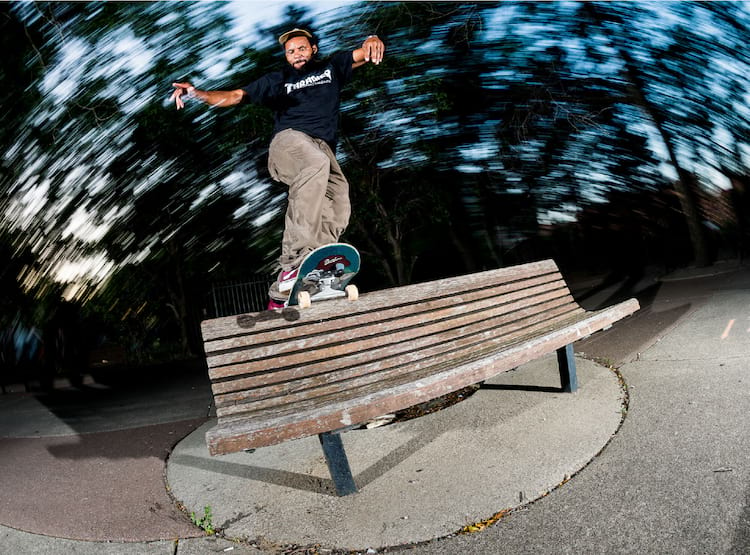 Front board in Detroit, 2016 Photo: Brook
Front board in Detroit, 2016 Photo: BrookHow did you navigate the substance abuse within skateboarding as a kid? Because I know nowadays there are a lot more young, ethnic skaters who enter the industry. There’s sort of a preconceived idea about skateboarding and what comes along with it that has a different effect on people who already come from communities where substance abuse is a huge issue. If there’s something you could say to those kids, what would it be?
Well, I can only speak on my approach or my experience, and what’s funny is for me it was the skaters who introduced all of that to me, at the parties and all of that. But I was just such on a mission, man. I was on a mission to be riding my skateboard and to progress. And for me, first of all, I couldn’t afford that stuff. Second of all, if I got high, I just felt crappy. And then drinking for me was like, dude, I hated the fool that it made me and I hated how it felt the next day. And I hated that there were too many occasions where it sabotaged me from enjoying the thing that I was most excited to do the next day. And I was just like, You know what? None of this stuff has helped me do what I want to do. And so, for me, it was just pretty easy. I was just like, Nah, I don’t need it. I’m cool. How many times can I feel so bad about the stupid stuff I did because of this thing? I was just like, Ugh. Throwing up at my buddy’s house and his parents having to clean it up. I mean, for me, this stuff was early—14 or 15 when I made these decisions and was just like, Nah, nah, I’m good. But I still always hung out with my buddies and when they were in it and that kind of helped me validate the decision. Because I was like, My man is acting a fool right now, dude. And so for me, that’s what it was. And also, I hated not being in control, if you will. I hated the fact that people would tell me stuff and I’d be like, “You’re kidding. I did what?” It started making me think, too, like What is going on? Who is doing it? Is it me doing it? So it was an early decision for me. I was just like, You know what? This isn’t going to help me do what I want to do. I’m just thankful that it was kind of an easy one for me to not struggle with it.
The straight-and-narrow paid off in Propaganda, Powell Peralta's 1990 follow-up
That reminds me of Tyshawn, man. He is the same way. He just was like, “Nope, I want to be Skater of the Year.” I thought that was so cool of him and I think about it so often because it just goes hand in hand in this modern day. It’s like, you go skate with your friends, you smoke weed and you just drink beer throughout the day.
Yeah, that’s what I’m trying to say. There’s nothing new under the sun. That was in ‘84 or ‘85 and that was hand in hand with skateboarding then, too.
Let me see; today I am 47 days sober.
Right on.
And I’m super happy about that.
That’s awesome, Sage.
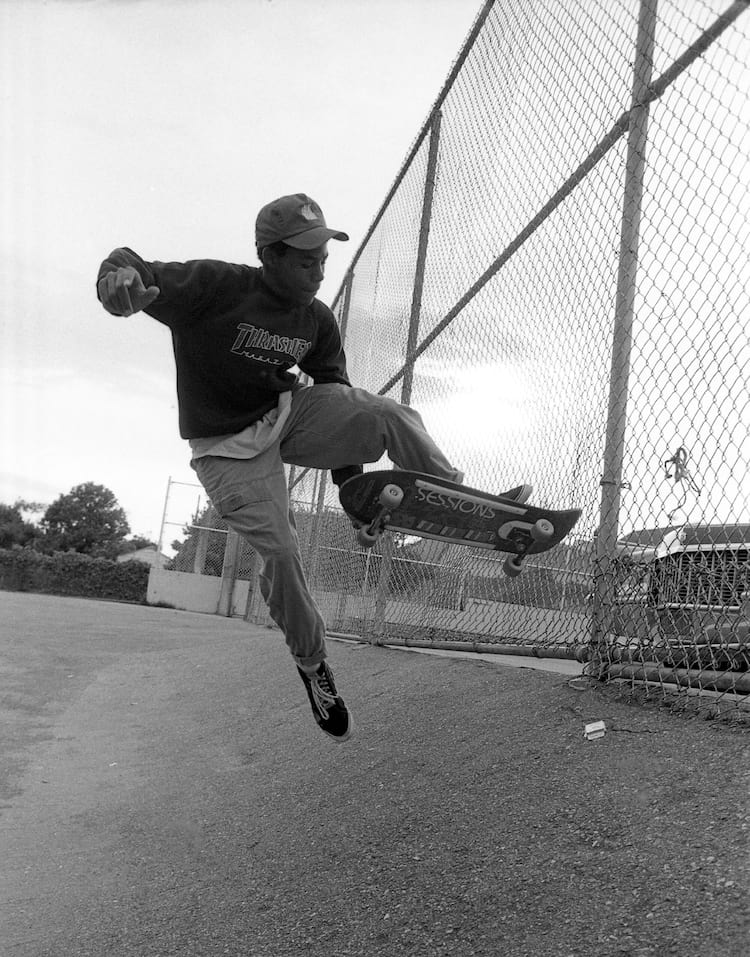 On that progression tip, young Ray spices up the no-comply with a stalefish Photo: Ogden
On that progression tip, young Ray spices up the no-comply with a stalefish Photo: OgdenYeah. I’m pretty hyped on it, and just to operate from that place of compassion and reason that I wasn’t able to see before. It even got to the point where just to even have the confidence to try a trick I needed a spliff and a beer in me. I needed that extra boost of confidence. And to find that confidence in myself now is just very gratifying.
Yeah, man. Because the ability is not coming from that.
Exactly.
God’s giving you the ability. Yeah, man, that’s awesome. I’m rooting for you, dude. You got it.
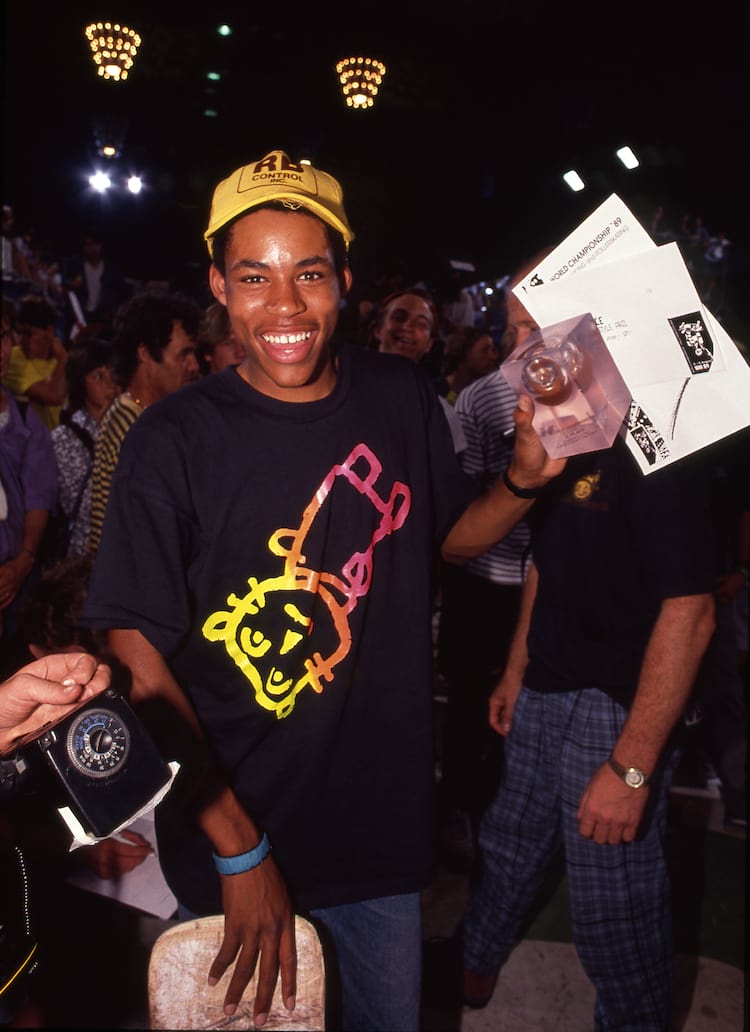 RB in control at the '89 World Championship Photo: KT
RB in control at the '89 World Championship Photo: KTWhat do you tell your kids about modern-day issues versus issues that Black people, indigenous people and people of color faced in the past?
Well, it’s just honestly, just a lot of times talking about the importance of the value of—if we’re created in God’s image, we have value, purpose and dignity. But the brokenness from broken humanity and at the heart level how that brokenness manages pride in so many things, it gets hard to function that way, right? But that is what’s at the heart of it. These things are all coming from brokenness that wasn’t supposed to be. And so it’s just important to trust and know that no matter how ugly the brokenness that’s presenting itself—it’s pain and hurt and what it’s doing to one another—at the core of it is always that truth. And it’s only because of the Cross of Christ that there can actually be compassion and a viewpoint to be able to see through the brokenness to the heart of the issue. Those are our conversations in our household, because we’re all a bundle of so much junk because of our brokenness. Just the reality of it, we all have it and it’s not to excuse anything. He who much has been forgiven, will forgive much. And so it’s from that place that we can exhort and encourage.
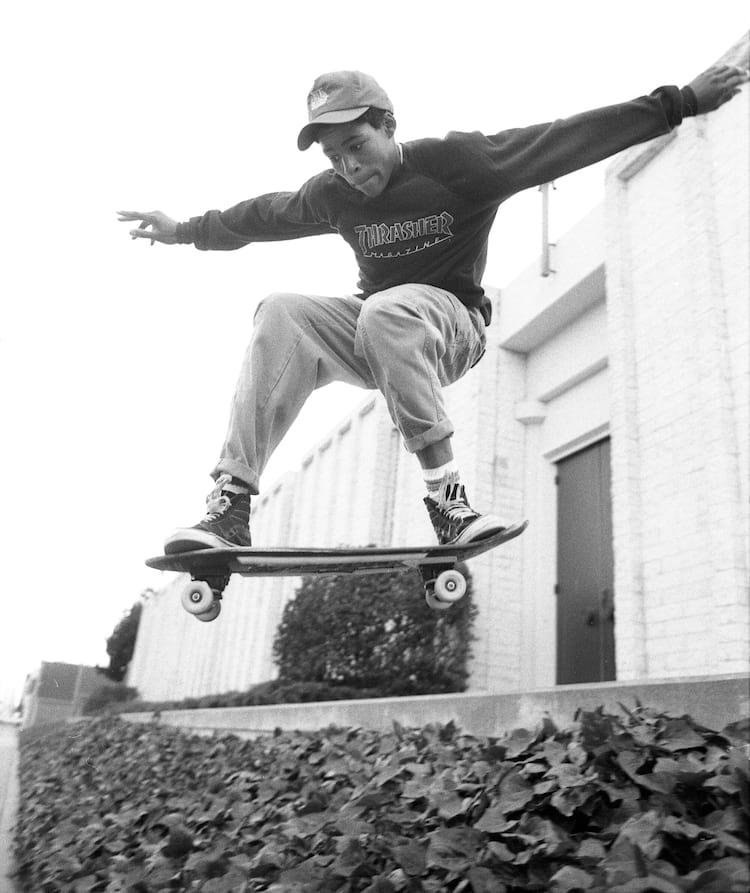 Barbee and the mag go way back Photo: Ogden
Barbee and the mag go way back Photo: Ogden
Man, I just come from the school of skateboarding, first and foremost, that functions from fun and progression as much as possible. And I feel very encouraged that it’s really opened up to being very inclusive to each person’s brand of that. The progression part is obviously tied to the fun aspect of riding this toy. You can progress and do amazing things on it, right? I was given the ability to do that. But not everybody has an ability to take it to certain levels and things like that. Therefore, there has to be that passion that is hopefully fueled by fun and just the playfulness of it. It’s so encouraging hearing that you love playing music and just all these other interests that make the culture so rich. I want to always see that existing, and dare I say thriving, because it’s all of that stuff that makes the environment so rich. But I don’t want to sit here and say it needs more of that, but I would like to see that. The skateboarding that I come from and the skateboarding that I subscribe to and love, it’s got all of that to it and I’d hate to see it be void of that aspect. People expressing themselves through interests that derive and are parallel to, but aren’t skateboarding, because it informs and creates this thing for us—I would love to see that still existing, being encouraged. I want to see people being like, “Man, I want to try this other thing too,” and not look at it as being opposed, but looking at it as being something that comes along with it and helps contribute. When Mark Gonzales and those guys started paint penning on their griptape and stuff, it made it just that much richer. And that came from his interest in doing art, and he wanted to explore that and express himself in that way. And so if skateboarding is the quilt and all of these other interests that make up so much of skateboarding, if those things are the patches, just keep adding patches. Yeah, that’s what I would love to see in skateboarding.
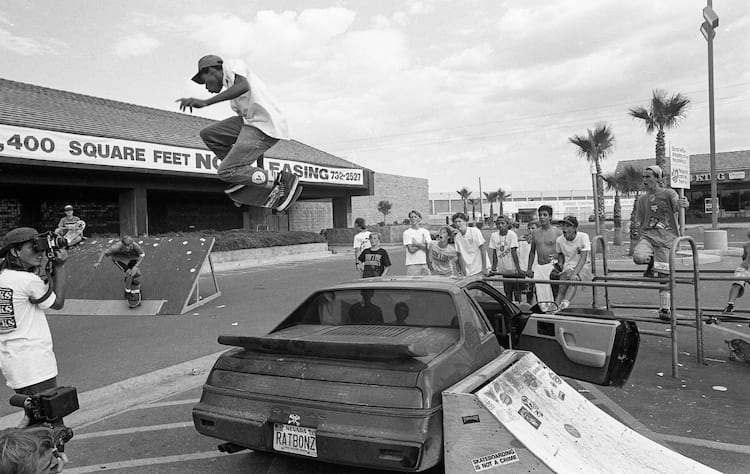 Call it a gumbo, call it a quilt, but no matter your metaphor, it's clear this skateboarding thing would be so much less exciting without Ray Barbee's contribution. Ramp-assisted flight over the Rat Bones mobile Photo: Cochrane
Call it a gumbo, call it a quilt, but no matter your metaphor, it's clear this skateboarding thing would be so much less exciting without Ray Barbee's contribution. Ramp-assisted flight over the Rat Bones mobile Photo: Cochrane-
4/15/2023
Cal's Pharmacy's "Land" Photo Feature
Cal's Pharmacy connected Portland's pros with its up-and-coming kids to produce another full-length. Our guy Brook was there from the streets to the theater seats and came back with a grip of flicks from this Pacific Northwest experience. Dig in. -
4/05/2023
STILL WATCHIN: Hewitt and Bailey in Japan
Hewitt, Bailey and The Butcher journey to Japan with the Old Man in search of a lost skatepark. Between burning bowls and sleeping under the stars they returned with a cover for the ages. -
3/31/2023
RIP IN PEACE: Robbie McKinley
Robbie skated with effortless speed, finesse and only two truck bolts in each truck. He also fished, surfed, barbecued and cooked turduckens. His friend Chris Casey remembers the life of a truly remarkable figure. -
3/10/2023
RIP IN PEACE: Thomas Taylor
Thomas Taylor was a giant in the Atlanta scene and provided a blueprint for how to live the fullest life as a skateboarder. From his pro career to building a family and fostering the community through his Stratosphere shop, he is remembered by everyone he touched. Read closely as his loved ones reflect on his incredible ride. -
1/05/2023
"No Way, LA: Darkroom Keeps It Crusty" Article
The coasts are well-covered territory, so the Darkroom team took the interstate less traveled while making their latest video. Get to know this dedicated crew of rippers along with a check-in with Pendleton. As seen in our November '23 issue.
